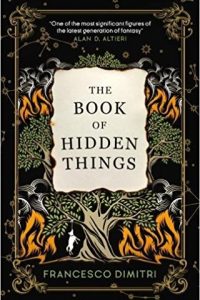Lois Tilton reviews Short Fiction, mid-March
Not a lot of stories this time, but not many disappointments, either. I give the good story award to the very short piece by Kat Howard in Apex.
Publications Reviewed
- Realms of Fantasy, April 2011
- Subterranean, Spring 2011
- Apex Magazine, March 2011
Realms of Fantasy, April 2011
Damnation Press is celebrating its acquisition of this zine with a dark fantasy theme issue. I’m pleased to see that, in addition to the fiction, there is an article by Theodora Goss on the history of vampire tradition, the proper thing having been replaced on the bookshelves these days by an influx of drek in a classic case of Gresham’s Law: Bad vampires drive out good.
The stories are predominately light dark fantasy, although the mix includes a couple of pieces in a darker hue.
“A Witch’s Heart” by Randy Henderson
A variation on the Hansel and Gretel story. The witch, who seems to have strongly feminist views, takes Gretel as an apprentice in her craft. As for Hansel,
“Brother-bother. He is well. I have put him out in the stable so we shall be safe, oh yes. You do not see what secrets-dirty-secrets he has in his little man’s heart.”
The twist at the end is not entirely unexpected.
“The Sacrifice” by Michelle M Welch
Anders and Gilien are young law clerks sent to interview a battered woman, supposedly the victim of rape. But the woman can not speak, so there can be no case; soon she disappears. One day enemy soldiers raid the town and the woman suddenly appears, picks up a sword, and leads some of the king’s discharged veterans to drive them off. She explains her courage by saying that she is already dead. She becomes known as the Dead One, and Gilien and Anders join the growing band who follower her.
They are the followers of the Dead One, and as the villagers of Kerr emerge to witness the slaughter that has freed them, seeing the silent warriors and the woman who has led them standing in the blood, they begin to call all of the soldiers dead ones. The villagers avert their eyes as they pass, and though they give them respect as the saviors of the village, they hide their children so that the shadows of the warriors do not cross them.
This one appears to be modeled on the Joan of Arc legend and has a some pointed comments on the role of women in such societies, and the fate of the victims of rape in war. But it has its own history and takes its own road, exploring the ways in which history and legend diverge. A great deal of the interest is in watching the relationship between Anders and Gilien as it shifts, as one boy grows up and the limitations of the other are exposed. The rather flat, dispassionate affect of the narrative also plays an important role.
–RECOMMENDED
“Little Vampires” by Lisa Goldstein
An old woman tells her daughter a story of the time she and a group of companions told each other Halloween stories that revealed a great deal about themselves. A young woman had a story of trick-or-treating when she was in school and went to the house that everyone warns kids about:
“There were no lights on in the room, just a candle on a table. I could see that the candle was white, and that it had burned pretty far down, but I couldn’t really make out anything beyond that. I could hear something, though, a kind of buzzing. After a while I figured out what it was — flies, buzzing somewhere inside the house.”
Most of the women don’t believe this one, but they all believe the story that comes next.
The narrative structure here is odd, with nested frames that seem at first to be extraneous and pretty dull. As genre readers, we expect at first, with some relief, that we have finally come to the point with the trick-or-treating story, but in fact it only introduces the vampire metaphor. The real story is the mundane one of dysfunctional familial relationships, the story of the frame, linked by the thematic line, “I’d do anything for her.”
“By Shackle and Lash” by Euan Harvey
As the title suggests, scenes of torture may squick out the more sensitive readers. Wahid is dismissed from the elite Mukhabarat for cowardice and assigned as punishment to work in the dungeons, slopping the prisoners. In one cell he encounters a woman who speaks in a language unknown to him, and whose blue eyes cast a spell that Wahid at first tries to resist.
“It never stops,” Salafaz said, his voice low. “Always, you can hear it. Singing. There is singing in the sky. And after you’ve heard it, you can see, truly see.
A strong story of tyranny and freedom in a world where Wahid believes there are only two choices, to be a prisoner or a jailer, but learns that there are other options. While the setting is ahistorical, references to a Mukhabarat and a Shah recall some of the more distasteful dictatorships of recent history. It is these scenes that make this piece dark; the fantastic element is rather hopeful.
“The Strange Case of Madeleine H Marsh (Age 14 ½) by Von Carr
The Great Old Ones materialize in Maddie’s basement when her parents have left her in charge of the house for a week. This is not a good thing.
Now it was Monday, and already she’d broken a glass while unpacking the dishwasher, and her shampoo had caused a weird green stain on the bathtub, and the Dark Gods of H.P. Lovecraft had invaded the basement, and she’d lost her math homework, and she was going to be late to school and fail her quiz and nothing would ever be okay ever again.
Clever and entertaining humor in the tone of teenaged angst.
Subterranean, Spring 2011
It seems that Subterranean is operating on the meteorological calendar instead of the solar, as it started to post the contents of this issue in the beginning of March. As usual, the complete contents is left for the reader to discover, but so far there is work by Buckell, Rusch and Lansdale up on the site, with MacLeod and Kowal also promised.
“The Fall of Alacan” by Tobias S Buckell
A tale set in the shared world of the author’s previous, “The Executioness” –- a setting perhaps better known for Paolo Bacigalupi’s “The Alchemist.” In this world, the use of magic results in a deadly growth known as bramble. The city of Alacan is almost entirely surrounded by it, and the struggle to eradicate it is futile. As people flee the city, an unscrupulous thief named Myzna inherits an unwelcome charge, the young son of his oldest friend. Now he has to use his ingenuity to get them both out of Alacan before the bramble closes all exits.
At first, with Myzna climbing a tower surrounded by thorns, I thought this would be a fairytale variation, but the story took a different, rather prosaic direction. I stumbled over some awkward prose [From here he could see the last few merchants of the day who camped out in front of the Mayor’s Mansion leaving their brightly colored stalls.] and couldn’t see the sense when Myzna, after a rich score, decides to squander his coins instead of buying passage out of the city that he knows is doomed.
“Show Trial” by Kristine Kathryn Rusch
In Paris after WWII, Lieutenant Robert Parker is hiring translators for the upcoming war crimes trials and suffering from overexposure to the war’s horrors, when he meets a special woman.
She was no different than the other women leaving the Metro, heading toward the Louvre on their lunch break, and yet she was. Because behind those fine cheekbones, behind the half-smile on her lips, was a light that he had never seen before. It was as if she had swallowed a bit of the sun, and its rays emanated through her pores.
After she becomes one of the translators, Parker’s initial fascination turns to distaste and distrust, both because of her nonexistent documentation and her vengeful attitude towards the Nazi prisoners to be tried.
This novella is a work of historical fiction with only a single fantasy element, and its star is the setting, with scenes of postwar Paris and Nuremberg so deeply detailed and realized with such authority that I am almost willing to overlook my suspicions about a sandwich spread thickly with butter in 1945 Paris. But readers may think there a more setting here than the story really needs, or that the author may be overly fond of these scenes for their own sake. Nathalie Renard is someone who disappears as we are looking at her, a person to whom concealment is her first nature, and Parker as a character is as colorless as his name. He is a perfect pair of eyes, however, for readers to watch through as the chaotic Allied machinery of war and justice assembles in the ruins of Nuremberg, preparing to deliver the verdict of the victors. The treatment of the ethical issues is thoughtful and well-informed.
It is not until near the end of the story that Parker is told that paralleling the war he knew was another, in which magic was a weapon. While this information explains Nathalie, it is not really central to the story at hand but rather a link to other works of the author set in this universe. Readers unfamiliar with these other works will find a complete and satisfying story here. But there is clearly much more that has been going on in the background.
“The Crawling Sky” by Joe R Lansdale
Western horror from the master.
Wood Tick wasn’t so much a town as it was a wide rip in the forest. The Reverend Jebidiah Mercer rode in on an ebony horse on a coolish autumn day beneath an overcast sky of humped up, slow-blowing, gun-metal-gray clouds; they seemed to crawl. It was his experience nothing good ever took place under a crawling sky. It was an omen, and he didn’t like omens, because, so far in his experience, none of them were good.
A young fellow named Norville claims his wife was taken by haints, a story that the Reverend credits although the denizens of Wood Tick do not. Sure enough, Norville’s cabin is haunted by a thing summoned up from some other dimension. The Reverend figures it’s his mission to destroy it, but the thing puts up a hard fight.
The attraction of a piece like this is only secondarily in the monsters. The main thing is the storytelling, and here it is prime. If the thing in the well is revolting, much more so is the town of Wood Tick, and it may be the greater deed when the Reverend decks one of its vicious spawn in the side of the head with a rock.
–RECOMMENDED
Apex Magazine, March 2011
A couple of original fantastic settings.
“The Dust and the Red” by Darin Bradley
Fantasy dust bowl. Every farming family seems to have its own particular fetish to bind the earth, to keep it theirs. The Lindsays have a pearl that they coat with wax; the Finchers have a little wax man. But the earth wants to come loose, to escape. The dust kills the children with fevers. The Lindsays are golden-haired, like the wheat they grow; the Finchers shift to cotton. The wax Fincher turns white as cotton, the Finchers turn white; they thrive. The Lindsays’ pearl fails them, which seems to have something to do with their son Jonah using it to play marbles.
This sort of thing isn’t supposed to make literal sense. It’s meant to be metaphorical, poetic. Now, on the one hand, the piece does evoke the time of the dust bowl, as well as a bit of a Cautionary Tale about foreclosures and Hard Times. But the metaphorical/poetic aspect isn’t strong enough to make me forget that I do prefer things to make more literal sense than this: The fields, white and proper, are as tar-black as the sky. Too much here is not clear, like the exchange, whatever it is, that is supposed to keep the soil in place (as opposed to the wax of the fetishes). And I can’t help recalling that dust bowls are caused as least as much by drought as by poor cultivation practices, and that cotton is a far more water-demanding crop than wheat.
“The Speaking Bone” by Kat Howard
An island made of bones, built up from the corpses of the shipwrecked as others lost at sea, where three immortal women dwell. The island attracts pilgrims who seek a miracle, an oracle.
They arrived by casting themselves upon the shore, with the other flotsam and jetsam carried on the tide. They made pilgrimage from the edge of the salt-tear sea. Over bones whiter than cloud, whiter than page, whiter than death, they walked. Past bones lachrymal and parietal they quested.
This one is successfully poetic — poetry formed from the names of bones — and in fact it might be called more of a prose poem than a story, in the absence of such elements as characters and plot, which, in this case, are not at all missed. The mystery is fantastically fabulist, magical and mythic. Neat idea and well-executed.
–RECOMMENDED






Pingback:Realms of Fantasy Reviewed
Pingback:By Shackle and Lash at Life is not fair